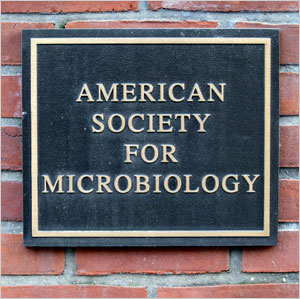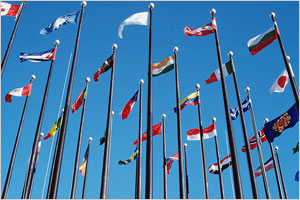 ASM sign / Photo by ASM
 World flags / Photo Credit
|
History of ASM The American Society for Microbiology is the oldest and largest single life science membership organization in the world. Membership has grown from 59 scientists in 1899 to more than 43,000 members today, with more than one third located outside the United States. The members represent 26 disciplines of microbiological specialization, plus a division for microbiology educators. ASM is comprised of six boards - Education, International, Meetings, Membership, Public and Scientific Affairs, and Publications, plus the American Academy of Microbiology. Boards guide the major ASM programs. Each board has committees with specific assignments within the board's area of responsibility. In addition, there is one standing committee: Communications. International Board of ASMThe International Board develops, sustains, and promotes the global activities of the American Society for Microbiology. It accomplishes this mission through the integrated implementation of the following goals:
The International Board consists of the following committees: International Membership Committee (IMC)
ASM Ambassador Program
Global Outreach Program International Education Committee (IEC)The International Fellowship Program offers young investigators from developing countries the opportunity to work with microbiologists in the U.S. or Canada. Each awardee visits North America for a minimum of six weeks and collaborates with an ASM member who is permanently employed at an accredited institution. ASM currently has Fellowship programs in Latin America, Asia, Africa, and India. The International Professorship Program seeks to provide microbiological expertise and resources to faculty and students throughout the world. The program is designed to furnish an institution of higher learning with resources enabling a North American ASM member, who is scientifically recognized for his/her area, to teach a hands-on, highly interactive short course on a single topic in the microbiological sciences. ASM currently has Professorship programs in Latin America, Asia, Africa, and India. The International Mentoring Program is designed to connect young scientists in developing countries with ASM members who are experienced microbiologists. Mentors assist with an array of activities, such as career and grant advice, and offer help in reviewing papers for publication. The Volunteer Translators Network was created to make ASM web-based materials more accessible to international members. Through this program, ASM members can assist in translating important resources such as the Microbe Library into other languages. Currently, the IEC is working with Spanish, French, and Portuguese-speaking members and actively seeking additional volunteers. More information about the above programs can be found at www.asm.org/international. You may also contact ASM International Affairs directly in Washington DC at +1-202-737-3600 or international@asmusa.org. International Laboratory Capacity Building (LabCap) CommitteeSince 2005, ASM has been harnessing the expertise of its global members to support laboratory capacity strengthening in resource-limited countries via the LabCap Program. This website is devoted to the LabCap program. More information can be obtained by returning to the homepage, www.LabCap.org. |
